

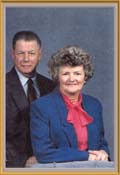








 As Josephine writes:
As Josephine writes:
The following write up my not be the best written, and grammar and sentence structure but itwill be a attemt to at least tell something about the Wentzel family.
My Mother as responible for relating to me many of the things recorded here. My Father's father moved from Germany to Norway where he met and married my Grandmother. To them were born three sons: John, Michael and Christian. They lived in a suburb o Christiania, now called Oslo. The village was Hadeland, a glass factory town where my faher, Christian worked as a glass blower and for many years, sang in the hometown church choir in norway. Here he met and married my mother, Mathea Pederson (Pedersdatter), who also worked here as a packer of the finished product. (My father as a small boy, climbed a tree in Oslo to see General Grant, then President of the United States, pass by in a parade.)
Mathea came from a large family of eight children, four girls and four boys. The girls were Caroline, Mathea,
Sophie and Elisa. The boys were Peder, Nels, Torsten and Otto. My
Mother's Father was a cobbler and made many shoes, not only for his own
family, but for others, since this was his trade. As a family, they
lived in a large building which also was occupied by others. I suppose
it was what we call an apartment building, except that all shared
the same kitchen--a very large room with a huge stove. They took turns
, each family having a specific time in which to cook for their own.
Lots of friendly chatter went on here and alot of "Lefse"  made when a few got together in that kitchen. It was an interesting place, and the
aroma aising from all the cooking surely whetted the appetites of all in
the building. This was my Mother's home as she grew up, and I was told
by her uncle that she was the prettiest girl around there. Her uncle,
Hans, came to America also and often visited in our home at Battle Lake,
Minnesota, many years later.
My Mother's cousin, Hoff, had arrived in America long before my parents
and was a prosperous farmer living south of Battle Lake. He needed
help, so he sent for my Father in 1879, and a few months later,
my Father borrowed money from Mr. Hoff to send for his family. They
came over in a sailing ship--My Mother and children and two maiden
ladies on board helped with the children. It was a sad parting when my
Grandfather saw her off at the pier--going so far away to an unknown
land--a dangerous voyage. They all shed a few tears at parting.
made when a few got together in that kitchen. It was an interesting place, and the
aroma aising from all the cooking surely whetted the appetites of all in
the building. This was my Mother's home as she grew up, and I was told
by her uncle that she was the prettiest girl around there. Her uncle,
Hans, came to America also and often visited in our home at Battle Lake,
Minnesota, many years later.
My Mother's cousin, Hoff, had arrived in America long before my parents
and was a prosperous farmer living south of Battle Lake. He needed
help, so he sent for my Father in 1879, and a few months later,
my Father borrowed money from Mr. Hoff to send for his family. They
came over in a sailing ship--My Mother and children and two maiden
ladies on board helped with the children. It was a sad parting when my
Grandfather saw her off at the pier--going so far away to an unknown
land--a dangerous voyage. They all shed a few tears at parting.
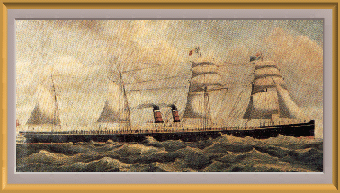
A small log cabin in a wooded area was provided for them and not far from two of Mother's cousins. Mother had never lived in the country, so this was a new as well as a frightening experience. Soon after she arrived, my Father went to work on the Great Northern Railroad just being built out of Fergus Falls. He would be away a week or two at a time and so it was a lonely life for Mother. When he came home, she met him at the door with clean clothing which he took to a shed neary, also warm water for a bath before being admitted to the house. In those days all precautions had to be taken against body lice. He worked on the railroad until he had earned enough to repay most of his debt to Mr. Hoff. They had a few animals, a pig, and a cow which Mother cared for near an open area near the house. They also had a dog. It was not unusual for a wolf to come along and finish the dog's food when mother sat milking the cow. The wolves howled almost every night, which didn't help, but she soon realized she was safe inside. The railroad owed my Father eighteen dollars when he left and he was never paid.
Later they managed to buy a small farm about two or three miles north of Battle Lake. The rich soil produced an abundant harvest so in the fall a grainery as well as some stalls in the barn were filled and then the remainder was piled up outside. Wheat sold then at five cents a bushel. This farm was located on a lake and included in the aacreage was a small island. My Father had a lime deposit there and sold lime. Here my brothers built a small tent using some of Mother's sheets--much to her dismay. She rescued most of them as they were needed in the house. They had a good time while it lasted. They crossed over to this island by a small stretch of water, sometimes it wld be dry there and the island was called a penninsula. In this log cabin of two rooms and an upstairs, several of the children were born. Mother said that when Helmer was just two and I was born that he slept in a bed close to the window which had a wide windowsill. Every night he would wake up and eat his lunch--a sliceof bread and a glass of milk left there, without bothering anyone. The lake nearby provided great fun for the boys, swimming in the summer and skating and sledding in the winter. When Helmer was about four and was supposed to stay home, the older boys went skating, so without anyone knowing it, he followed them and acidently fell into an air hole in the ice. Luckily, Conrad looked back to see him disappear and hurridly rescued him by pulling him up by his hair. It was a close call. The farm was enroute to a Grist Mill in Amor Township. Friends of my parents would cross the ice in the winter with their load of grain to be ground into flour and feed and stopped overnight as it was about half way. My Mother prepared what she had on hand for their supper and they slept on the floor. In the morning they had breakfast and continued on their way. The same procedure was repeated on thei way back home. My Mother never knew at any time when to expect these people so always extended her hospitality in the best way she could. These friends were happy with anything she served, even though it was sometimes very humble fare. They remained close friends as long as they all lived. People in those ays were always ready to help one another and not for pay. It was on this farm that my Fathr was confronted by a bear when he was putting up a haystack. Bears were rarely seen in the area. He scrambled up the stack of hay with a pitchfork in his hand but the bear did not try to follow him. It gave my father a real scare and he returned home in a hurry and the bear disappeared into the woods. They often walked to town for a few supplies. They had traded in old Clitheral before Battle Lake was much of a place.

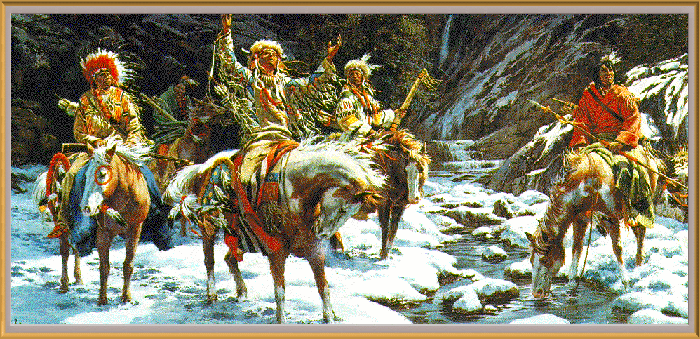
 |
The Chippewas and the Sioux were always on the warpath and one battle took place at Battle Lake - That's how the village got its name. The Sioux won. Many years later when I was a teenager, a Sioux lawyer came back and spoke at the annual old settlers' picnic helo down on the shore of Battle Lake. His old mother dressed in beautiful indian costume was with him. We were all impressed by the progress this particular indian had made. His english was perfect and we enjoyed the speech because he told about the battle fought there. |
After selling this farm, we lived for a short time on the Hans Hanson farm adjoining Battle Lake at the east end. Mr. Hanson was a blacksmith in town. Then my parents bought the acreage one mile west of Battle Lake where we continued to live until all the family was gone. It was a small house, but a very hospitable one. People loved to visit there and we had company almost every Sunday, especially after the automobile was the mode of travel. It was here we lived in the grainary while the house was being built, my parents celebrated their 25th wedding anniversary here and we had a picnic. Neighbors and friends came, bringing much needed articles of furniture as well as other things. It was a great day for all including me who can barely remember this event.
The older children, Oscar, Fanny and Conrad had already left home. Fanny and husband were present. Axel did not go to high school, Helmer went one year but I finished high school in 1910 . We had just a mile to school which was far enough in the wintertime, especially when the snow was deep. Sometimes I would get a ride with the neighbors if I got over the hill in time. There were four girls from the same family and we rode in a big sled. This helped because walking in the deep snow is not easy and I rarely missed a day at school because of weather or road conditions. Maybe this helped me to receive the honor of being Valedictorian both from eighth grade and high school.
My Father had a beautiful tenor voice and for many years sang in the hometown church choir in Norway. He also sang baritone. The language used in our church at the time was Norwegian. I can remember attending church with my parents. The wmen all sat on one side and the men on the other. One could easily hear my Father's voice above all the rest - he knew all the songs from memory and sang out loud and strong, it was beautiful. Many years later, a neighbor of ours told me and my husband that he enjoyed my father's singing and missed hearing it when he was no longer alive. He hardly ever missed going to church even when my mother could not. He had a great sense of humor and people liked him. At Christmastime, it was customary to distribute gifts placed under the big candle-lit tree as well as having a children's program. On one of thee occasions my Father received a lovely package, upon opening it, he found some delicious smoked herring - it was a joke, of course, and he got a big laugh out of it as he never ate fish but liked to catch them. We celebrated the holidays until New Years day by going to other churches for their activities and to big dinners at the homes of our friends living south of Battle Lake.
My Mother was a sweet, quiet person with a very loving personality. She was slow to anger and had more patience than most people have. She always had the coffee pot on the stove and would offer anyone who came a little lunch. Her home-made bread, rolls and doughnut were delicious. The boys often took a handful of doughnuts on their way to bed so they didn't last long. We often had "Lefse" or flatbread with our lunch or evening meal. Coffee and lunch were served in the morning and in the afternoon, then dinner and supper. If company dropped in for a visit in the evening we again had coffee an whatever she had in the cupboard. My husband thought this was a wonderfl way to live. When we were there in the summertime on a visit, he enjoyed having fresh bread covered with cream and sugar for breakfast. On Sunday, we often had deicious fried fish - my Mother fixed fish better than anyone we knew. She also mae a big bowlful of cream mush topped with melted butter produced from the cream in the big black kettle and then topped off with sugar and cinnamon as our desert.
My father died in 1926 at the age of 78 and my mother in 1937 at the age of 85.
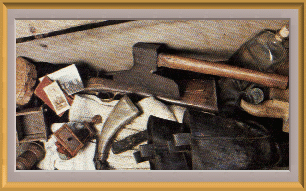


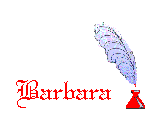

Created 8/15/2000 6:37
AM ![]() by Tommy Högberg, Sweden
by Tommy Högberg, Sweden ![]()